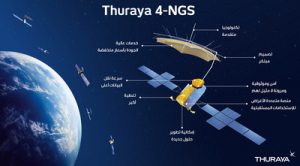
According to latest statement,Airbus has been selected by Al Yah Satellite Communications Company (Yahsat), the UAE’s leading global satellite operator, to build Thuraya 4-NGS, the next generation mobile telecommunications system that will drive the continued advancement of Thuraya’s L-band business.
Thuraya 4-NGS will deliver higher capabilities and flexibility while increasing capacity and coverage across Europe, Africa, Central Asia and the Middle East, enabling next generation mobility solutions for all customer segments, including defense, government and enterprise.
This is a major milestone in Yahsat’s commitment towards transforming Thuraya and rolling out its next-generation system, which entails a complete overhaul of its space and ground platforms, enabling a new set of services, products and solutions, across a greater coverage area. The new capabilities will drive leadership across many strategic product lines, such as maritime, IoT, and data solutions offering a wide spectrum of throughput capabilities and the highest speeds available in the market, while reinforcing Thuraya’s strengths in the MSS voice market.
Thuraya’s next generation system will provide a world of opportunities to customers, service partners, hardware manufacturers and integrators, enhancing user experience across land, sea and air to support multiple customer segments, including government, consumer and enterprise.
Furthermore, an advanced portfolio of solutions to support government and defense users will accelerate Thuraya’s leadership in this market, both within the UAE, regionally and globally. Meanwhile, all existing products and services will continue to be supported by Thuraya’s space and ground segments, enabling service continuity during and after the transformation programme.
This latest commitment from Yahsat takes its total committed investment to date to well over US$500 million, and more is anticipated in the coming years, including an option with Airbus to build Thuraya 5-NGS (an additional satellite identical to Thuraya 4-NGS), strengthening its coverage and capabilities across the Asia Pacific region.
Khaled Al Qubaisi, Chairman of Yahsat’s Board of Directors and CEO of Mubadala’s Aerospace, Renewables & ICT stated, “The half a billion US dollar commitment, underscores our position as a market leader, pioneer and disruptor. We are creating a multipurpose and flexible satellite ecosystem that is attuned for growth and future diversification and Thuraya 4-NGS is a key milestone in our ongoing mission to provide advanced yet affordable satellite solutions with levels of performance, reliability and security at the leading edge of today’s technology.”
Ali Al Hashemi, CEO of Thuraya and General Manager of Yahsat Government Solutions (YGS) continued, “Thuraya 4-NGS represents a significant evolution of our L-band capabilities, enabling a wider range of interoperable FSS/MSS solutions for Thuraya and YGS customers. This will be critical in delivering superior defense solutions, such as battlefield communications, to our government users, while offering a complete MSS portfolio to all of our current and future customers and partners to drive the next phase of innovation and growth.”
Jean-Marc Nasr, Head of Airbus Space Systems said, “Building on a relationship with Yahsat that dates back more than 10 years, our selection is testament to the innovation and engineering excellence of Airbus’ geostationary satellites. Thuraya 4-NGS, as well as being electric, will also benefit from our latest processed payload technology giving increased flexibility and adaptability over the course of its life in orbit. Yahsat’s new project reinforces Airbus Defence and Space’s position as the world’s number one in electric propulsion satellites.”
Based on the state-of-the-art all-electric Airbus Eurostar Neo Platform, Thuraya 4-NGS will incorporate a large 12-metre L-band antenna and a payload with on-board processing providing advanced routing flexibility of up to 3200 channels with dynamic power allocation over a large number of spot beams. It is scheduled for operation in 2024.

